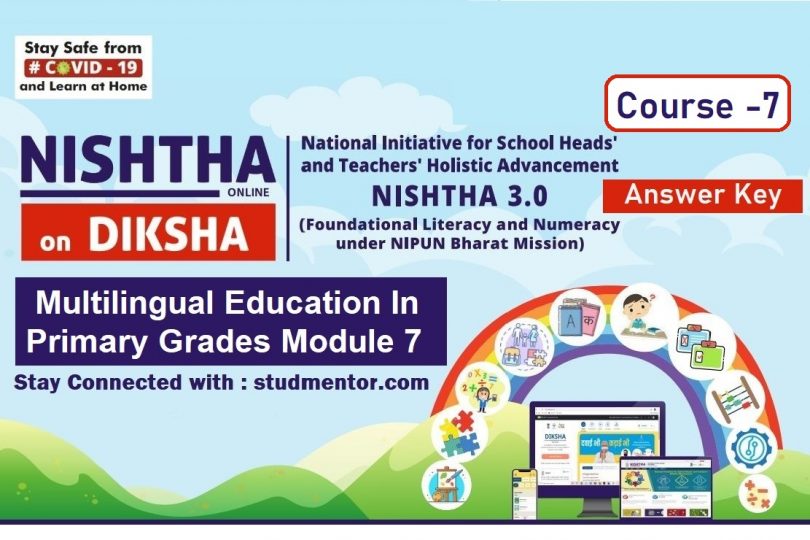Nishtha 3.0 FLN Diksha Portal Module 7 Multilingual Education In Primary Grades Answer Key in English
Que 1. It shall be the endeavour of every state and of every local authority within the Stage to provide adequate facilities for instruction in the mother-tongue at the primary stage of education to children belonging to linguistic minority groups” — which document is this statement recorded in ?
Answer : – The Indian Constitution
Que 2. “Learning process must gradually move from the familiar to the unfamiliar”. This idea can be found in :
Answer :- NCF – 2005
Que 3. Studies on the Ethiopian model of language in education show that –
Answer :- Children studying through their mother tongues performed better in all academic subjects
Que 4. Multilingualism means-
Answer :- Use of two or more languages by the person
Que 5. What kind of language do we use in our day-to-day life ?
Answer :- Mixed Language
Que 6. Who amongst the following children will struggle the most while learning?
Answer :- Ramesh, whi speaks Bhojpuri in his family and community and studies in an English medium school
Que 7. Kamala lives in the Kota district of That and speaks Hadoti at home. She has joined grade 1 after a delay of 4 months; today is her first day at school. What will you do so that she feels comfortable in the classroom?
Answer :- I will informally chit-chat with her in Hadoti
Que 8. Which of the following is not a benefit of Multilingual education ?
Answer :- Learning how to read and write in English from grade 1
Que 9. For the success of the Foundational Literacy and Numeracy (FLN) Mission, it is necessary to –
Answer :- Making use of languages that are familiar to children
Que 10. Why so about 25% of children in elementary school face a severe learning disadvantage in foundational years ?
Answer :- Language used in school and at home are different.
Que 11. According to UDISE, how many languages are used as a medium of instruction in Indian schools ?
Answer :- 36
Que 12. Which of the following statements regarding multilingual education is true ?
Answer :- Children’s languages are used as scaffolds for learning new/unfamiliar languages.
Que 13. Which of the following is true –
Answer :- Proficiency in various languages is developed in an interdependent fashion
Que 14. Making use of L1 in teaching-
Answer :- helps in better learning of all the subjects.
Que 15. Which of the following is not a key feature od Multilingual Education?
Answer :- Dominance of one language over others in the classroom
Que 16. Creative knowledge can be constructed by traversing the bridge of —
Answer :- Familiar Language
Que 17. Kamala ji wants to teach Hindi to grade 2 students. Which of the following strategies should she use ?
Answer :- Use of Hindi language as per the level of comprehension by students
Que 18. Who does not face any learning disadvantages due to language used in schools?
Answer :- Children who study in English medium schools have ample exposure to English at Home
Que 19. Who has proposed the “Common Underlying Proficiency” hypothesis of language learning?
Answer :- Jim Cummins
Que 20. Language of communication used by adivasi communities working in the tea plantations of Assam can be called as –
Answer :- Link language
Read Also
Learning Assessment Quiz | Nistha 3.0 Module 8 Quiz Answer Key In English
I Hope you like the article of the Nishtha 3.0 FLN Diksha Portal Module 7 Multilingual Education In Primary Grades Answer Key in English, If you like then share to Others,
If any doubt regarding the Answer then Leave comments. we will revert back to you.
Happy Reading, Stay Connected

